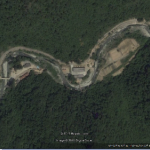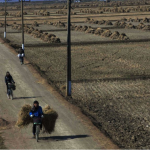- DETERRENCE: China’s future nuclear force infrastructure: a notional breakout scenario
- DPRK: The Democratic People’s Republic of Korea outlook for the food supply and demand in 2014/15
- GOVERNANCE AND CIVIL SOCIETY: Electricity supply could be maintained without outdated Wolseong and Kori reactors
- CLIMATE CHANGE ADAPTATION: Services and role of Information Communication Technology (ICT) in India
D ETERRENCE: China’s future nuclear force infrastructure: a notional breakout scenario, Mark Stokes, NPEC’s East Asian Alternative Nuclear Weapons Futures Conference, Honolulu (25-26 February 2014) [PDF, 0.2MB]
ETERRENCE: China’s future nuclear force infrastructure: a notional breakout scenario, Mark Stokes, NPEC’s East Asian Alternative Nuclear Weapons Futures Conference, Honolulu (25-26 February 2014) [PDF, 0.2MB]
China’s Chairman Central Military Commission controls China’s nuclear arsenal; the Second Artillery are sole custodians. An SLBM force and more powerful PLA navy could decentralize warhead custodianship. PLA Air Force and Second Artillery missile bases might follow suit.
- When sub goes silent, who has control of its nuclear warheads? Jeremy Page, Wall St Journal, October 24, 2014
- Misinterpreting China’s nuclear posture, Wu Riqiang, Lowy Interpreter, October 28, 2014
D PRK: The Democratic People’s Republic of Korea outlook for the food supply and demand in 2014/15 (November/October), Global Information and Earl Warning System of United Nations Food and Agricultural Programme (3 February 2015)
PRK: The Democratic People’s Republic of Korea outlook for the food supply and demand in 2014/15 (November/October), Global Information and Earl Warning System of United Nations Food and Agricultural Programme (3 February 2015)
North Korea is making changes, but not necessarily progress. Unfortunately, North Korea is projected to have a larger than expected shortfall in grain production this year. The weather played a known negative role, managerial reforms likely played a positive role, but insufficient to overcome the weather. North Korea is shuffling diplomats. Such moves are consistent with several Kim Jong-un goals: consolidating rule, establishing rule, and implementing generational change. It is extremely unlikely the moves would result in sudden shifts in North Korean policy as most of the diplomats leaving have been the public face of North Korean diplomacy for the last 10-20 years and the new diplomats do not want to make a mistake early in their new job.
- North Korea reshuffles its UN diplomatic team, The Hankyoreh (13 February 2015)
- Korea names new point man on U.S. affairs, The Korea Times (11 February 2015)
- North Korea diplomatic channel loses its luster, Colum Lynch, The Washington Post (8 April 2013)
G OVERNANCE AND CIVIL SOCIETY: Report: Electricity supply could be maintained without outdated Wolseong and Kori reactors, Lee Seung-joon, Hankyoreh (10 February 2015)
OVERNANCE AND CIVIL SOCIETY: Report: Electricity supply could be maintained without outdated Wolseong and Kori reactors, Lee Seung-joon, Hankyoreh (10 February 2015)
The ROK budget office has projected that the ROK would maintain a stable energy supply even if two of its nuclear reactors remain offline, after a court ruling last year found that proximity to nuclear plants caused development of thyroid cancer and adding momentum to the ongoing anti-nuclear movement. A group of professors, activists and priests are also on a month-long walking protest to Seoul to oppose nuclear power.
- Fukushima meltdowns pervade S. Korea debate on reactor life, Heesu Lee, Bloomberg (14 January 2015)
- Parents protest against reactivation of Wolsung nuclear power plant, Korea Bizwire (6 February 2015)
- Professors, activists, priests rally against nuclear energy, Kim Se-jeong, Korea Times (8 February 2015)
C LIMATE CHANGE ADAPTATION: Climate change adaptation: services and role of Information Communication Technology (ICT) in India, Anup Prakash Upadhyay and Arvind Bijalwan, American Journal of Environmental Protection, vol. 4, No. 1, pp. 70-74 (2015) [PDF, 173KB]
LIMATE CHANGE ADAPTATION: Climate change adaptation: services and role of Information Communication Technology (ICT) in India, Anup Prakash Upadhyay and Arvind Bijalwan, American Journal of Environmental Protection, vol. 4, No. 1, pp. 70-74 (2015) [PDF, 173KB]
Information Communication Technologies (ICTs) can play a crucial role in supporting public outreach, building a data base, creating awareness of the impact of climate change and adaptation and suggesting possible interventions based on the data base for adaptive mechanisms. ICT can offer opportunities to address those challenges. However, ICTs as of today in India has not yet become effectively integrated into climate change adaptation planning.
- ICT-enabled development of capacity for climate change adaptation, Laxmi Prasad Pant and Richard Heeks, Centre for Development Informatics, Institute for Development Policy and Management, SED, UK (2011)
- ICTs as a key technology to help countries adapt to the effects of climate change, Cristina Bueti and David Faulkner, International Telecommunications Union/Climate Associates, World Resources Report-WRR (2015)
The Nautilus Peace and Security Weekly Report presents articles and full length reports each week in six categories: Austral security, nuclear deterrence, energy security, climate change and security, the DPRK, climate change adaptation and governance and civil society. Our team of contributors carefully select items that highlight the links between these themes and the three regions in which our offices are found — North America, Northeast Asia, and the Austral-Asia region.
Subscribe to NAPSNet to receive free weekly email reports.
- Editor: Arabella Imhoff
Contributors:
- Deterrence: Peter Hayes
- DPRK: Roger Cavazos
- Governance and Civil Society: Dyana Mardon
- Climate Change Adaptation: Saleem Janjua
- Climate Change and Security: Richard Tanter


I’ve just bookmarked this page, fantastic website!